Assessment Workbook Project: Behaviour Support Plan Development
VerifiedAdded on 2023/01/19
|49
|8701
|37
Homework Assignment
AI Summary
This assignment focuses on the development and implementation of a behaviour support plan for a child in an early childhood education setting. It involves identifying relevant sections of the National Quality Framework (NQF), National Quality Standards (NQS), and Early Years Learning Framework (EYLF) related to developing cooperative behaviour plans, strategies for inclusion, and family partnerships. The assignment includes an analysis of how different family styles and cultural beliefs affect educators, and how to minimize negative effects. The project requires the creation of a behaviour management plan, including background assessments, interviews with staff, observation of the child's behaviour, and the development of specific, measurable, achievable, realistic, and time-bound (SMART) objectives, preventive strategies, and alternative behaviours. The plan also addresses resource allocation, intervention timelines, and consideration of cultural practices. The assignment emphasizes the importance of collaboration with supervisors, colleagues, and family members to ensure the plan's effectiveness and ethical considerations, including obtaining necessary permissions and maintaining confidentiality.
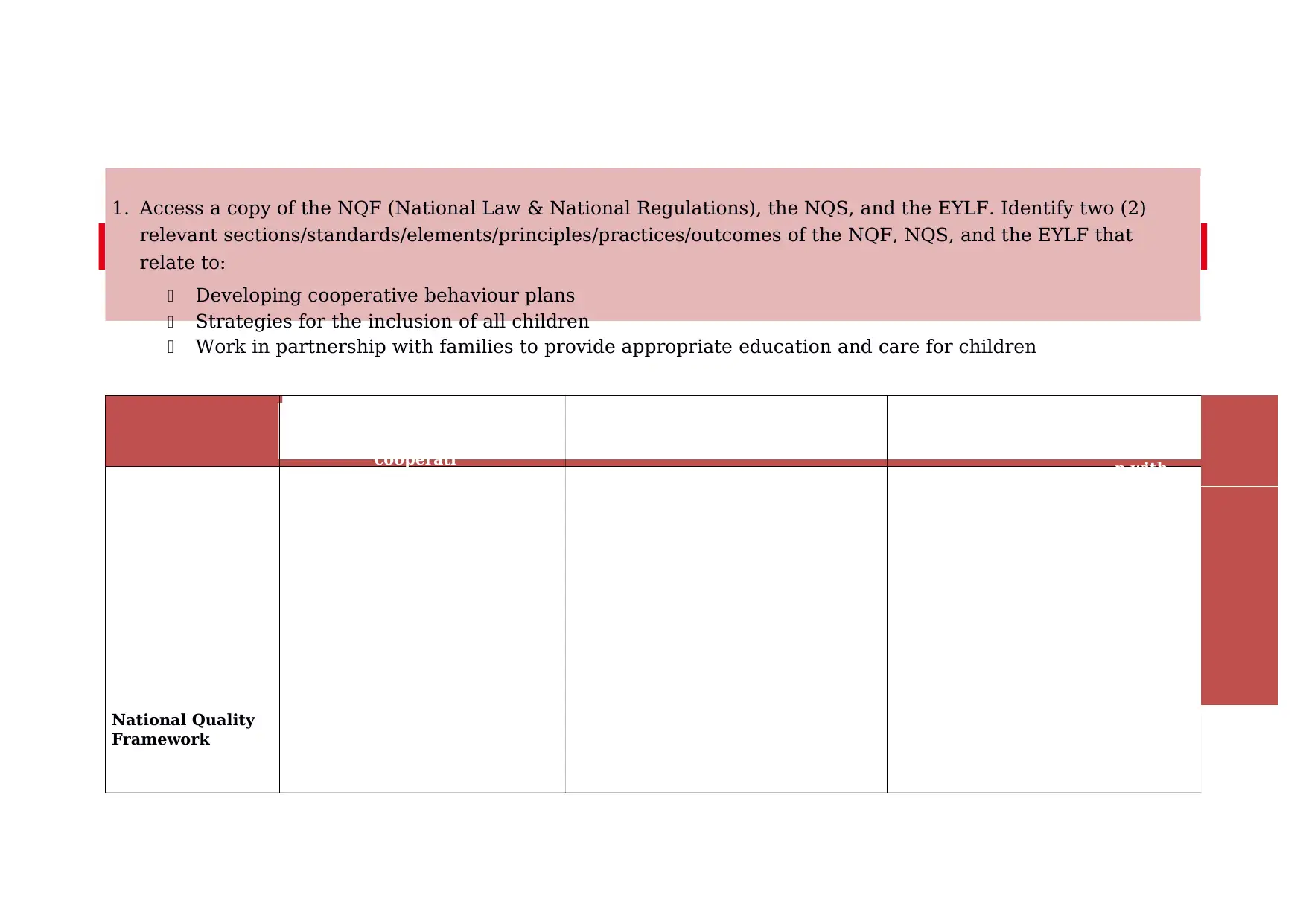
KNOWLEDGE ASSESSMENT
1. Access a copy of the NQF (National Law & National Regulations), the NQS, and the EYLF. Identify two (2)
relevant sections/standards/elements/principles/practices/outcomes of the NQF, NQS, and the EYLF that
relate to:
x Developing cooperative behaviour plans
x Strategies for the inclusion of all children
x Work in partnership with families to provide appropriate education and care for children
Plans for
developin
g
cooperati
ve
Work in
partnershi
p with
families
to
Inc
lusi
on
of
all
chil
dre
n
provide
appropria
te
education
and
behaviour care for
children
National Quality
Framework
1. Access a copy of the NQF (National Law & National Regulations), the NQS, and the EYLF. Identify two (2)
relevant sections/standards/elements/principles/practices/outcomes of the NQF, NQS, and the EYLF that
relate to:
x Developing cooperative behaviour plans
x Strategies for the inclusion of all children
x Work in partnership with families to provide appropriate education and care for children
Plans for
developin
g
cooperati
ve
Work in
partnershi
p with
families
to
Inc
lusi
on
of
all
chil
dre
n
provide
appropria
te
education
and
behaviour care for
children
National Quality
Framework
Paraphrase This Document
Need a fresh take? Get an instant paraphrase of this document with our AI Paraphraser
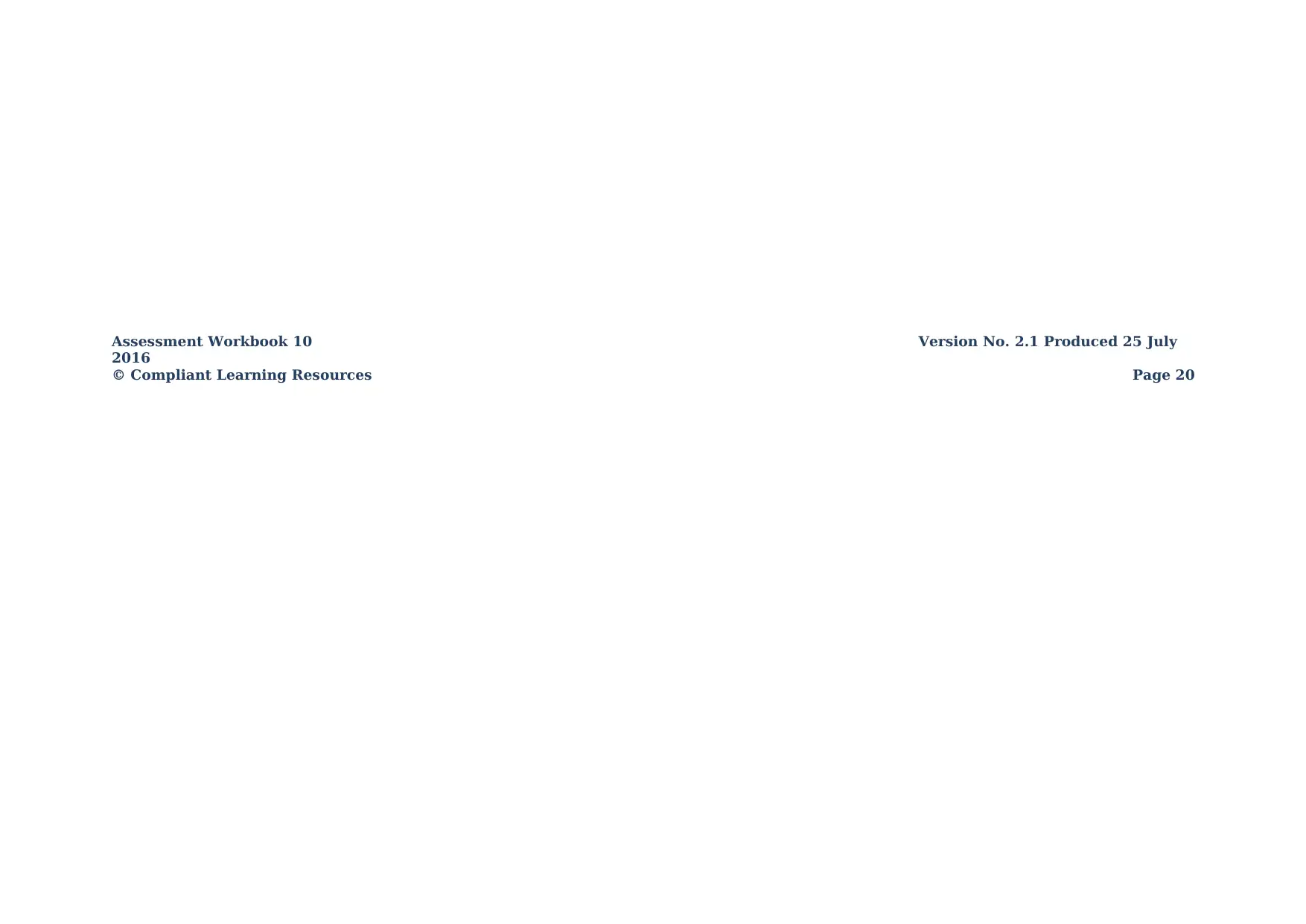
Assessment Workbook 10 Version No. 2.1 Produced 25 July
2016
© Compliant Learning Resources Page 20
2016
© Compliant Learning Resources Page 20
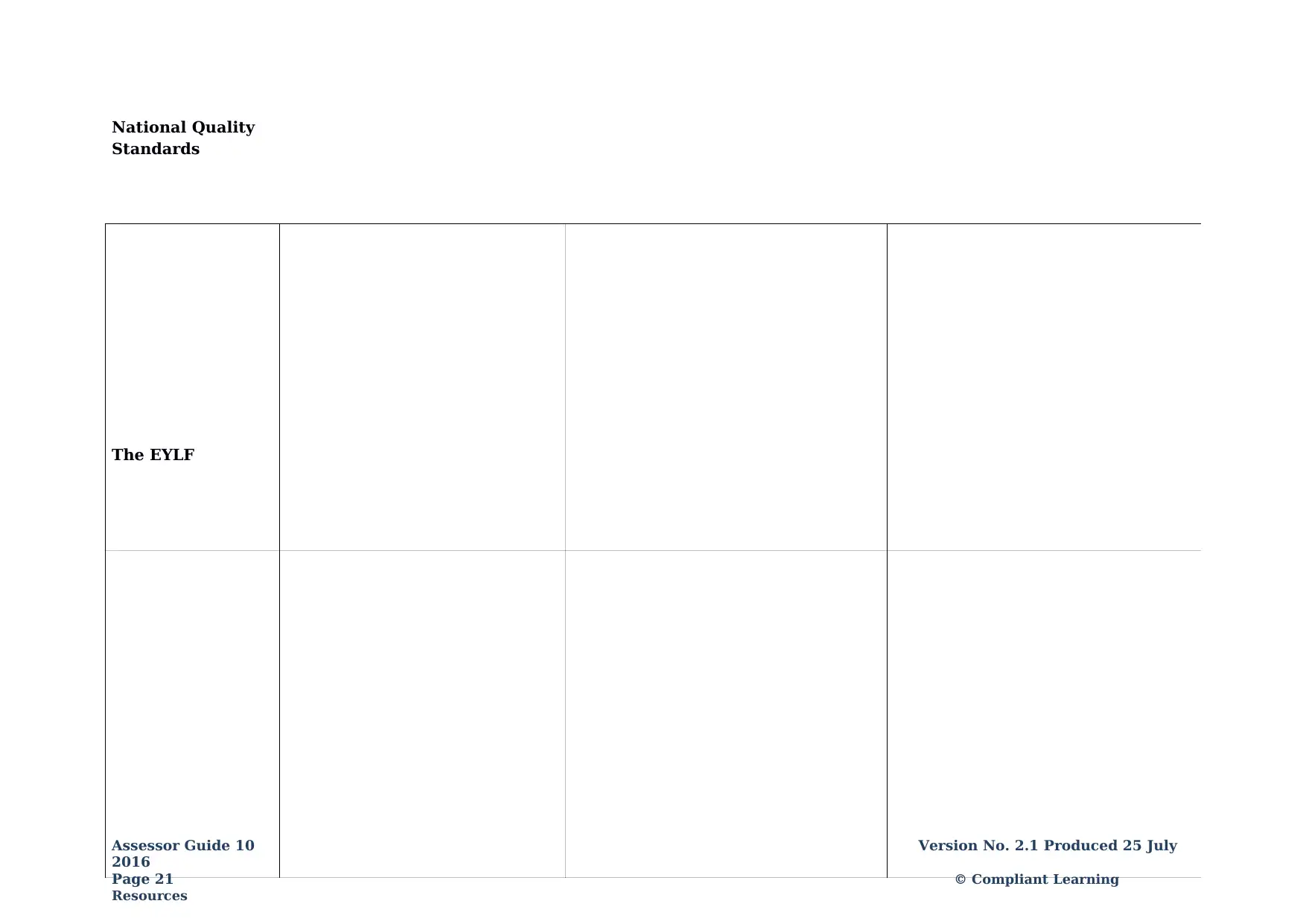
National Quality
Standards
The EYLF
Assessor Guide 10 Version No. 2.1 Produced 25 July
2016
Page 21 © Compliant Learning
Resources
Standards
The EYLF
Assessor Guide 10 Version No. 2.1 Produced 25 July
2016
Page 21 © Compliant Learning
Resources
⊘ This is a preview!⊘
Do you want full access?
Subscribe today to unlock all pages.

Trusted by 1+ million students worldwide
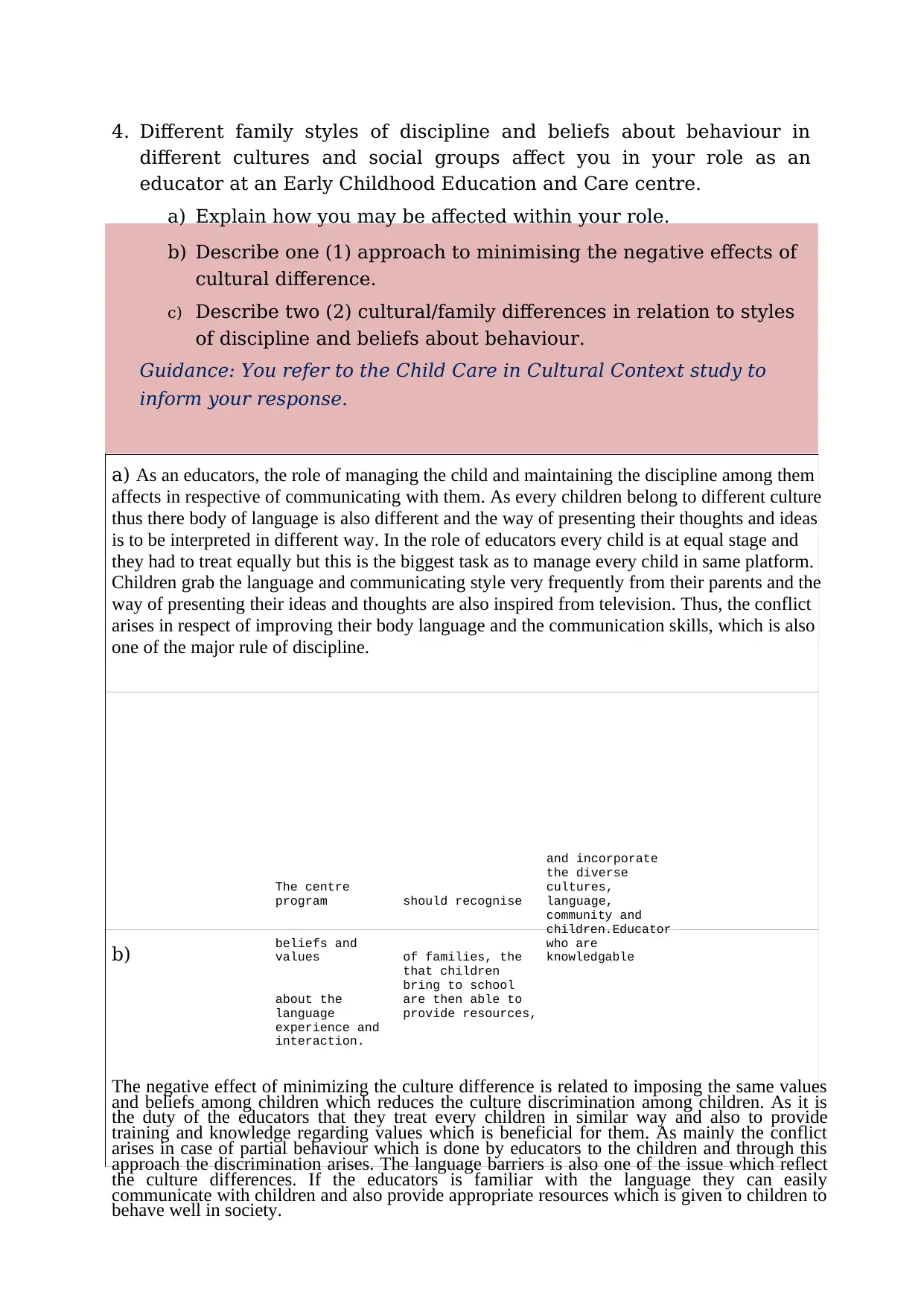
4. Different family styles of discipline and beliefs about behaviour in
different cultures and social groups affect you in your role as an
educator at an Early Childhood Education and Care centre.
a) Explain how you may be affected within your role.
b) Describe one (1) approach to minimising the negative effects of
cultural difference.
c) Describe two (2) cultural/family differences in relation to styles
of discipline and beliefs about behaviour.
Guidance: You refer to the Child Care in Cultural Context study to
inform your response.
a) As an educators, the role of managing the child and maintaining the discipline among them
affects in respective of communicating with them. As every children belong to different culture
thus there body of language is also different and the way of presenting their thoughts and ideas
is to be interpreted in different way. In the role of educators every child is at equal stage and
they had to treat equally but this is the biggest task as to manage every child in same platform.
Children grab the language and communicating style very frequently from their parents and the
way of presenting their ideas and thoughts are also inspired from television. Thus, the conflict
arises in respect of improving their body language and the communication skills, which is also
one of the major rule of discipline.
b)
The centre
program should recognise
and incorporate
the diverse
cultures,
language,
beliefs and
values of families, the
community and
children.Educator
who are
knowledgable
about the
language
that children
bring to school
are then able to
provide resources,
experience and
interaction.
The negative effect of minimizing the culture difference is related to imposing the same values
and beliefs among children which reduces the culture discrimination among children. As it is
the duty of the educators that they treat every children in similar way and also to provide
training and knowledge regarding values which is beneficial for them. As mainly the conflict
arises in case of partial behaviour which is done by educators to the children and through this
approach the discrimination arises. The language barriers is also one of the issue which reflect
the culture differences. If the educators is familiar with the language they can easily
communicate with children and also provide appropriate resources which is given to children to
behave well in society.
different cultures and social groups affect you in your role as an
educator at an Early Childhood Education and Care centre.
a) Explain how you may be affected within your role.
b) Describe one (1) approach to minimising the negative effects of
cultural difference.
c) Describe two (2) cultural/family differences in relation to styles
of discipline and beliefs about behaviour.
Guidance: You refer to the Child Care in Cultural Context study to
inform your response.
a) As an educators, the role of managing the child and maintaining the discipline among them
affects in respective of communicating with them. As every children belong to different culture
thus there body of language is also different and the way of presenting their thoughts and ideas
is to be interpreted in different way. In the role of educators every child is at equal stage and
they had to treat equally but this is the biggest task as to manage every child in same platform.
Children grab the language and communicating style very frequently from their parents and the
way of presenting their ideas and thoughts are also inspired from television. Thus, the conflict
arises in respect of improving their body language and the communication skills, which is also
one of the major rule of discipline.
b)
The centre
program should recognise
and incorporate
the diverse
cultures,
language,
beliefs and
values of families, the
community and
children.Educator
who are
knowledgable
about the
language
that children
bring to school
are then able to
provide resources,
experience and
interaction.
The negative effect of minimizing the culture difference is related to imposing the same values
and beliefs among children which reduces the culture discrimination among children. As it is
the duty of the educators that they treat every children in similar way and also to provide
training and knowledge regarding values which is beneficial for them. As mainly the conflict
arises in case of partial behaviour which is done by educators to the children and through this
approach the discrimination arises. The language barriers is also one of the issue which reflect
the culture differences. If the educators is familiar with the language they can easily
communicate with children and also provide appropriate resources which is given to children to
behave well in society.
Paraphrase This Document
Need a fresh take? Get an instant paraphrase of this document with our AI Paraphraser
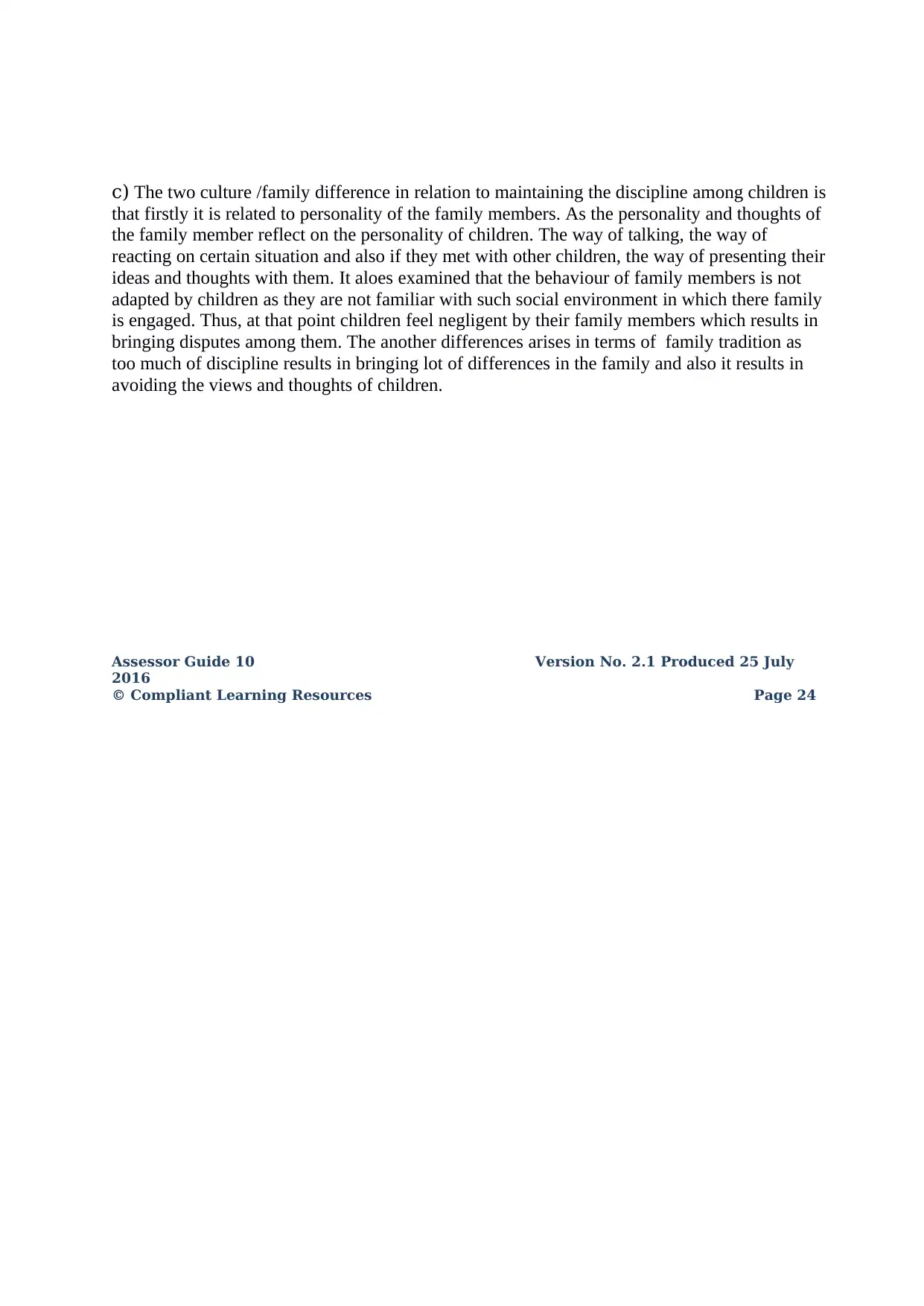
c) The two culture /family difference in relation to maintaining the discipline among children is
that firstly it is related to personality of the family members. As the personality and thoughts of
the family member reflect on the personality of children. The way of talking, the way of
reacting on certain situation and also if they met with other children, the way of presenting their
ideas and thoughts with them. It aloes examined that the behaviour of family members is not
adapted by children as they are not familiar with such social environment in which there family
is engaged. Thus, at that point children feel negligent by their family members which results in
bringing disputes among them. The another differences arises in terms of family tradition as
too much of discipline results in bringing lot of differences in the family and also it results in
avoiding the views and thoughts of children.
Assessor Guide 10 Version No. 2.1 Produced 25 July
2016
© Compliant Learning Resources Page 24
that firstly it is related to personality of the family members. As the personality and thoughts of
the family member reflect on the personality of children. The way of talking, the way of
reacting on certain situation and also if they met with other children, the way of presenting their
ideas and thoughts with them. It aloes examined that the behaviour of family members is not
adapted by children as they are not familiar with such social environment in which there family
is engaged. Thus, at that point children feel negligent by their family members which results in
bringing disputes among them. The another differences arises in terms of family tradition as
too much of discipline results in bringing lot of differences in the family and also it results in
avoiding the views and thoughts of children.
Assessor Guide 10 Version No. 2.1 Produced 25 July
2016
© Compliant Learning Resources Page 24
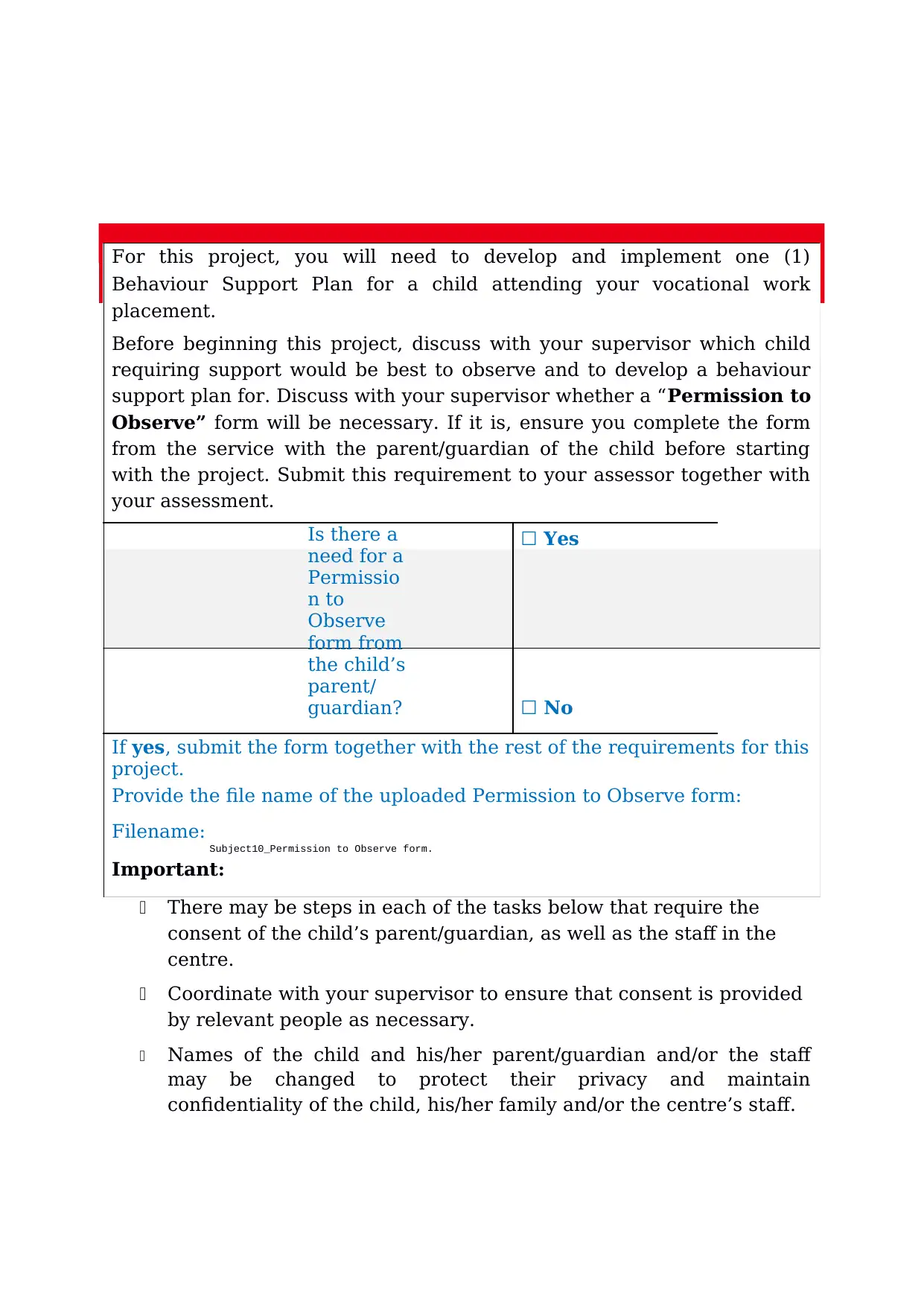
PROJECT 1: ESTABLISH AND IMPLEMENT
PLANS FOR DEVELOPING COOPERATIVE
BEHAVIOR
For this project, you will need to develop and implement one (1)
Behaviour Support Plan for a child attending your vocational work
placement.
Before beginning this project, discuss with your supervisor which child
requiring support would be best to observe and to develop a behaviour
support plan for. Discuss with your supervisor whether a “Permission to
Observe” form will be necessary. If it is, ensure you complete the form
from the service with the parent/guardian of the child before starting
with the project. Submit this requirement to your assessor together with
your assessment.
Is there a
need for a
Permissio
n to
Observe
form from
the child’s
☐ Yes
parent/
guardian? ☐ No
If yes, submit the form together with the rest of the requirements for this
project.
Provide the file name of the uploaded Permission to Observe form:
Filename: Subject10_Permission to Observe form.
Important:
x There may be steps in each of the tasks below that require the
consent of the child’s parent/guardian, as well as the staff in the
centre.
x Coordinate with your supervisor to ensure that consent is provided
by relevant people as necessary.
x Names of the child and his/her parent/guardian and/or the staff
may be changed to protect their privacy and maintain
confidentiality of the child, his/her family and/or the centre’s staff.
PLANS FOR DEVELOPING COOPERATIVE
BEHAVIOR
For this project, you will need to develop and implement one (1)
Behaviour Support Plan for a child attending your vocational work
placement.
Before beginning this project, discuss with your supervisor which child
requiring support would be best to observe and to develop a behaviour
support plan for. Discuss with your supervisor whether a “Permission to
Observe” form will be necessary. If it is, ensure you complete the form
from the service with the parent/guardian of the child before starting
with the project. Submit this requirement to your assessor together with
your assessment.
Is there a
need for a
Permissio
n to
Observe
form from
the child’s
☐ Yes
parent/
guardian? ☐ No
If yes, submit the form together with the rest of the requirements for this
project.
Provide the file name of the uploaded Permission to Observe form:
Filename: Subject10_Permission to Observe form.
Important:
x There may be steps in each of the tasks below that require the
consent of the child’s parent/guardian, as well as the staff in the
centre.
x Coordinate with your supervisor to ensure that consent is provided
by relevant people as necessary.
x Names of the child and his/her parent/guardian and/or the staff
may be changed to protect their privacy and maintain
confidentiality of the child, his/her family and/or the centre’s staff.
⊘ This is a preview!⊘
Do you want full access?
Subscribe today to unlock all pages.

Trusted by 1+ million students worldwide
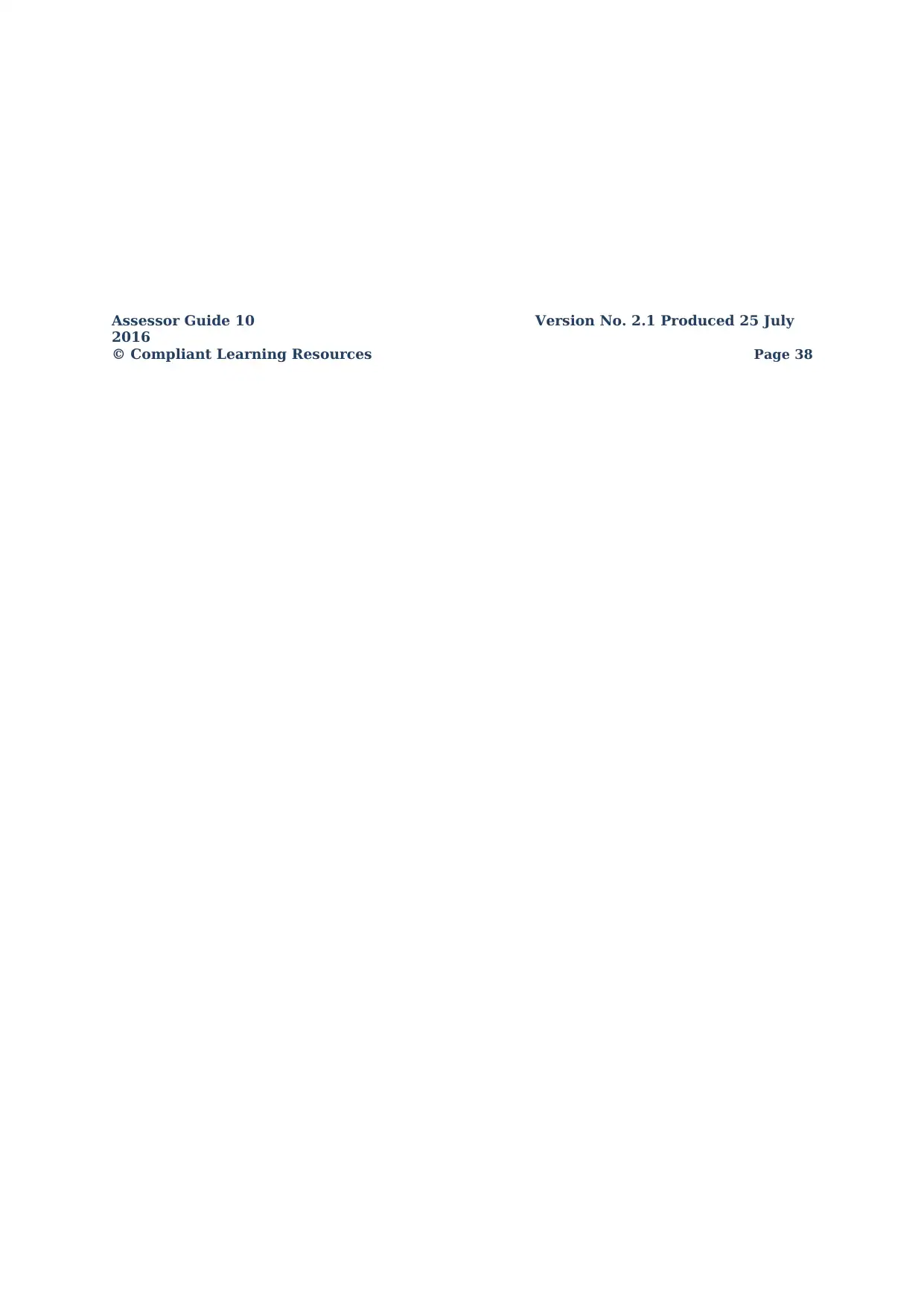
Assessor Guide 10 Version No. 2.1 Produced 25 July
2016
© Compliant Learning Resources Page 38
2016
© Compliant Learning Resources Page 38
Paraphrase This Document
Need a fresh take? Get an instant paraphrase of this document with our AI Paraphraser
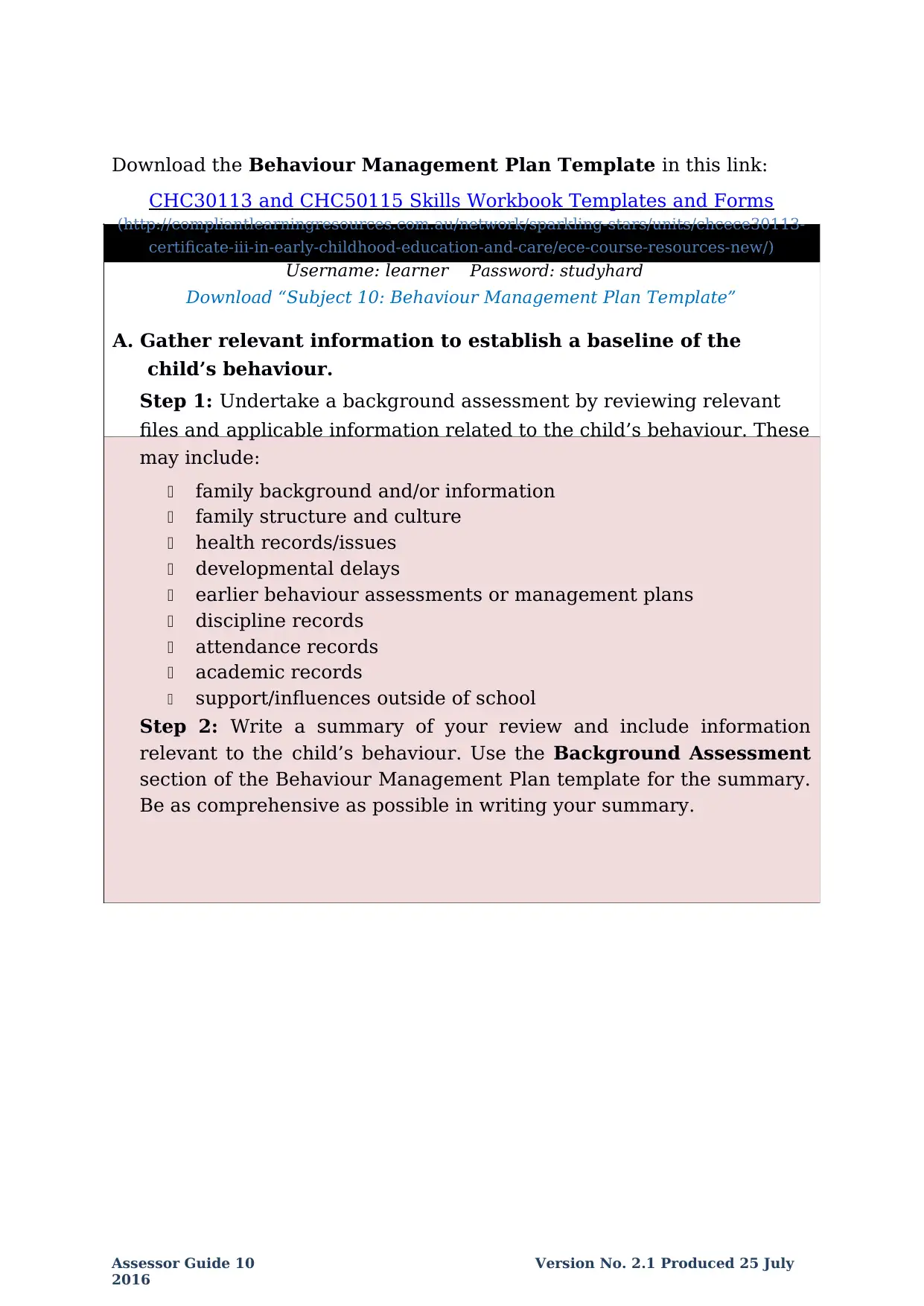
Task 1: Identify and review behaviour
Download the Behaviour Management Plan Template in this link:
CHC30113 and CHC50115 Skills Workbook Templates and Forms
(http://compliantlearningresources.com.au/network/sparkling-stars/units/chcece30113-
certificate-iii-in-early-childhood-education-and-care/ece-course-resources-new/)
Username: learner Password: studyhard
Download “Subject 10: Behaviour Management Plan Template”
A. Gather relevant information to establish a baseline of the
child’s behaviour.
Step 1: Undertake a background assessment by reviewing relevant
files and applicable information related to the child’s behaviour. These
may include:
x family background and/or information
x family structure and culture
x health records/issues
x developmental delays
x earlier behaviour assessments or management plans
x discipline records
x attendance records
x academic records
x support/influences outside of school
Step 2: Write a summary of your review and include information
relevant to the child’s behaviour. Use the Background Assessment
section of the Behaviour Management Plan template for the summary.
Be as comprehensive as possible in writing your summary.
Assessor Guide 10 Version No. 2.1 Produced 25 July
2016
Download the Behaviour Management Plan Template in this link:
CHC30113 and CHC50115 Skills Workbook Templates and Forms
(http://compliantlearningresources.com.au/network/sparkling-stars/units/chcece30113-
certificate-iii-in-early-childhood-education-and-care/ece-course-resources-new/)
Username: learner Password: studyhard
Download “Subject 10: Behaviour Management Plan Template”
A. Gather relevant information to establish a baseline of the
child’s behaviour.
Step 1: Undertake a background assessment by reviewing relevant
files and applicable information related to the child’s behaviour. These
may include:
x family background and/or information
x family structure and culture
x health records/issues
x developmental delays
x earlier behaviour assessments or management plans
x discipline records
x attendance records
x academic records
x support/influences outside of school
Step 2: Write a summary of your review and include information
relevant to the child’s behaviour. Use the Background Assessment
section of the Behaviour Management Plan template for the summary.
Be as comprehensive as possible in writing your summary.
Assessor Guide 10 Version No. 2.1 Produced 25 July
2016

Page 39 © Compliant Learning
Resources
Resources
⊘ This is a preview!⊘
Do you want full access?
Subscribe today to unlock all pages.

Trusted by 1+ million students worldwide
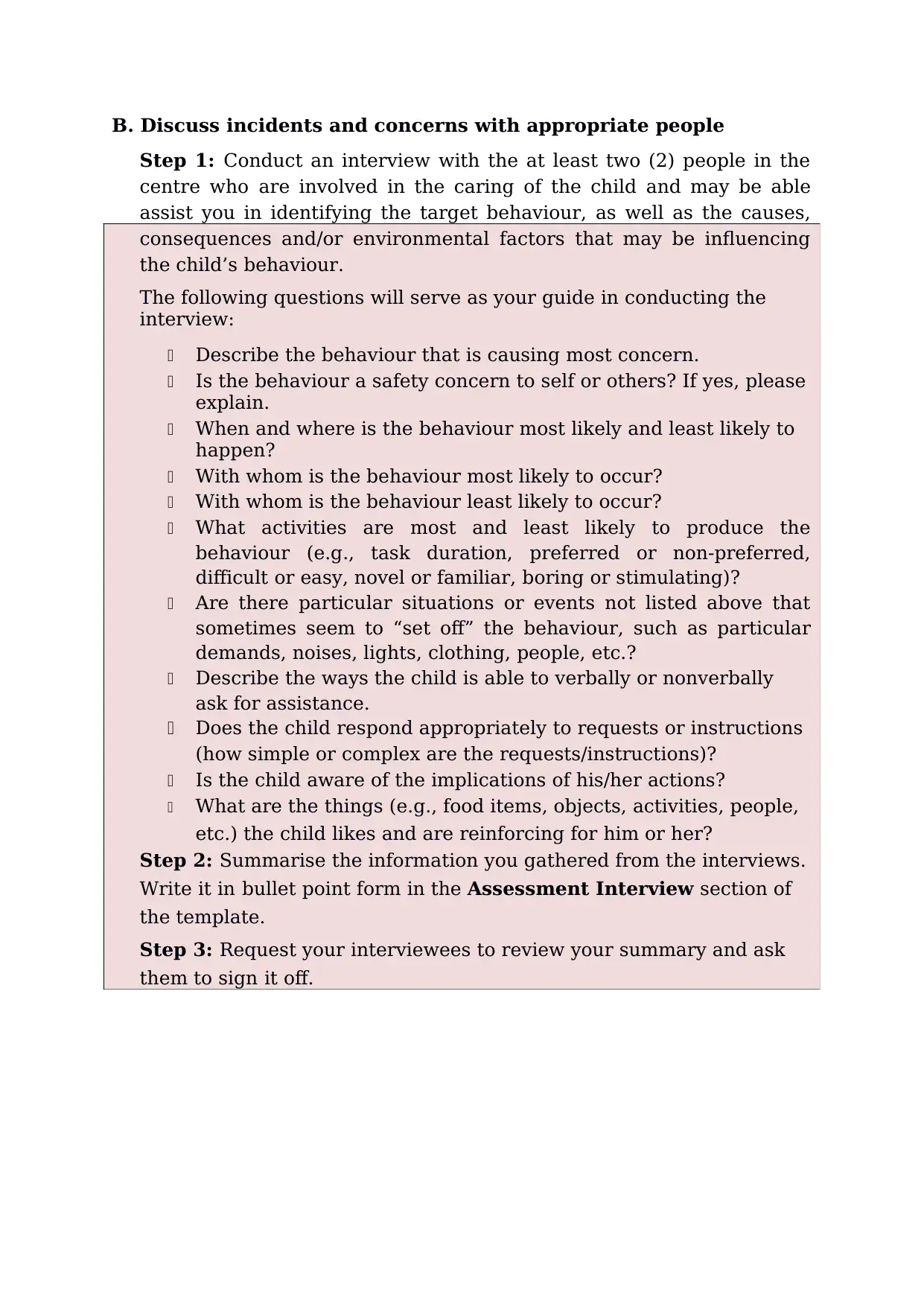
B. Discuss incidents and concerns with appropriate people
Step 1: Conduct an interview with the at least two (2) people in the
centre who are involved in the caring of the child and may be able
assist you in identifying the target behaviour, as well as the causes,
consequences and/or environmental factors that may be influencing
the child’s behaviour.
The following questions will serve as your guide in conducting the
interview:
x Describe the behaviour that is causing most concern.
x Is the behaviour a safety concern to self or others? If yes, please
explain.
x When and where is the behaviour most likely and least likely to
happen?
x With whom is the behaviour most likely to occur?
x With whom is the behaviour least likely to occur?
x What activities are most and least likely to produce the
behaviour (e.g., task duration, preferred or non-preferred,
difficult or easy, novel or familiar, boring or stimulating)?
x Are there particular situations or events not listed above that
sometimes seem to “set off” the behaviour, such as particular
demands, noises, lights, clothing, people, etc.?
x Describe the ways the child is able to verbally or nonverbally
ask for assistance.
x Does the child respond appropriately to requests or instructions
(how simple or complex are the requests/instructions)?
x Is the child aware of the implications of his/her actions?
x What are the things (e.g., food items, objects, activities, people,
etc.) the child likes and are reinforcing for him or her?
Step 2: Summarise the information you gathered from the interviews.
Write it in bullet point form in the Assessment Interview section of
the template.
Step 3: Request your interviewees to review your summary and ask
them to sign it off.
Step 1: Conduct an interview with the at least two (2) people in the
centre who are involved in the caring of the child and may be able
assist you in identifying the target behaviour, as well as the causes,
consequences and/or environmental factors that may be influencing
the child’s behaviour.
The following questions will serve as your guide in conducting the
interview:
x Describe the behaviour that is causing most concern.
x Is the behaviour a safety concern to self or others? If yes, please
explain.
x When and where is the behaviour most likely and least likely to
happen?
x With whom is the behaviour most likely to occur?
x With whom is the behaviour least likely to occur?
x What activities are most and least likely to produce the
behaviour (e.g., task duration, preferred or non-preferred,
difficult or easy, novel or familiar, boring or stimulating)?
x Are there particular situations or events not listed above that
sometimes seem to “set off” the behaviour, such as particular
demands, noises, lights, clothing, people, etc.?
x Describe the ways the child is able to verbally or nonverbally
ask for assistance.
x Does the child respond appropriately to requests or instructions
(how simple or complex are the requests/instructions)?
x Is the child aware of the implications of his/her actions?
x What are the things (e.g., food items, objects, activities, people,
etc.) the child likes and are reinforcing for him or her?
Step 2: Summarise the information you gathered from the interviews.
Write it in bullet point form in the Assessment Interview section of
the template.
Step 3: Request your interviewees to review your summary and ask
them to sign it off.
Paraphrase This Document
Need a fresh take? Get an instant paraphrase of this document with our AI Paraphraser
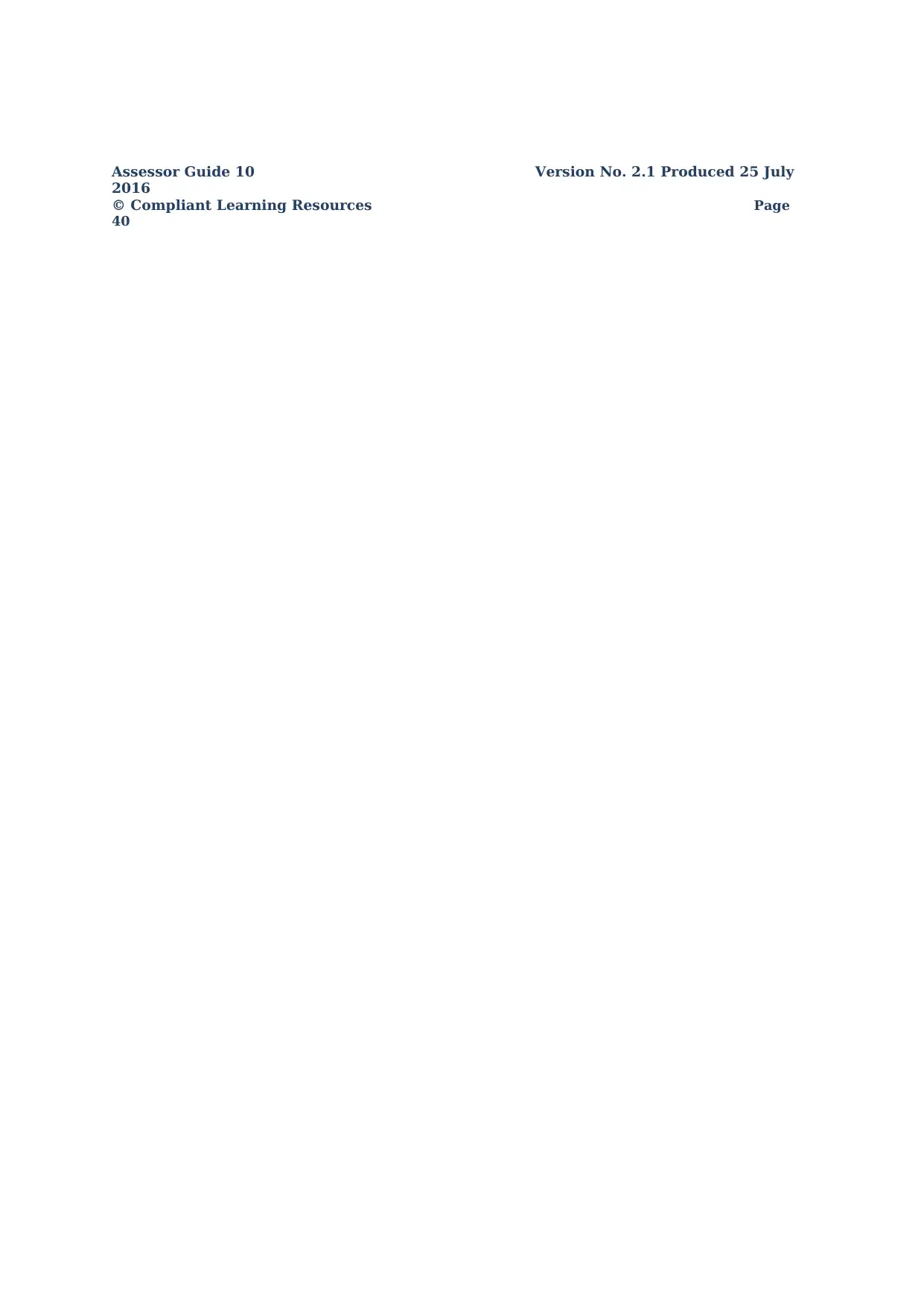
Assessor Guide 10 Version No. 2.1 Produced 25 July
2016
© Compliant Learning Resources Page
40
2016
© Compliant Learning Resources Page
40
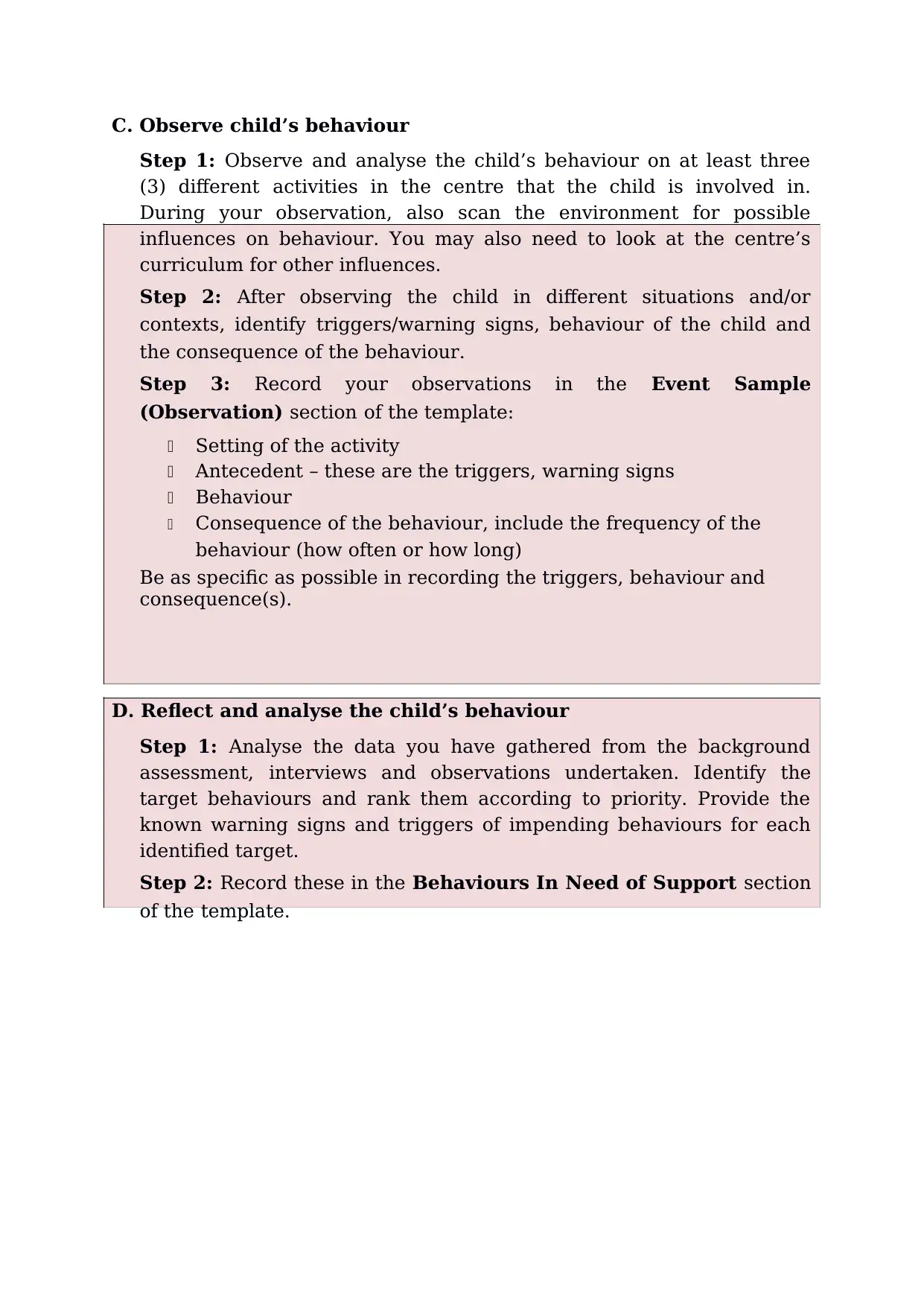
C. Observe child’s behaviour
Step 1: Observe and analyse the child’s behaviour on at least three
(3) different activities in the centre that the child is involved in.
During your observation, also scan the environment for possible
influences on behaviour. You may also need to look at the centre’s
curriculum for other influences.
Step 2: After observing the child in different situations and/or
contexts, identify triggers/warning signs, behaviour of the child and
the consequence of the behaviour.
Step 3: Record your observations in the Event Sample
(Observation) section of the template:
x Setting of the activity
x Antecedent – these are the triggers, warning signs
x Behaviour
x Consequence of the behaviour, include the frequency of the
behaviour (how often or how long)
Be as specific as possible in recording the triggers, behaviour and
consequence(s).
D. Reflect and analyse the child’s behaviour
Step 1: Analyse the data you have gathered from the background
assessment, interviews and observations undertaken. Identify the
target behaviours and rank them according to priority. Provide the
known warning signs and triggers of impending behaviours for each
identified target.
Step 2: Record these in the Behaviours In Need of Support section
of the template.
Step 1: Observe and analyse the child’s behaviour on at least three
(3) different activities in the centre that the child is involved in.
During your observation, also scan the environment for possible
influences on behaviour. You may also need to look at the centre’s
curriculum for other influences.
Step 2: After observing the child in different situations and/or
contexts, identify triggers/warning signs, behaviour of the child and
the consequence of the behaviour.
Step 3: Record your observations in the Event Sample
(Observation) section of the template:
x Setting of the activity
x Antecedent – these are the triggers, warning signs
x Behaviour
x Consequence of the behaviour, include the frequency of the
behaviour (how often or how long)
Be as specific as possible in recording the triggers, behaviour and
consequence(s).
D. Reflect and analyse the child’s behaviour
Step 1: Analyse the data you have gathered from the background
assessment, interviews and observations undertaken. Identify the
target behaviours and rank them according to priority. Provide the
known warning signs and triggers of impending behaviours for each
identified target.
Step 2: Record these in the Behaviours In Need of Support section
of the template.
⊘ This is a preview!⊘
Do you want full access?
Subscribe today to unlock all pages.

Trusted by 1+ million students worldwide
1 out of 49
Related Documents
Your All-in-One AI-Powered Toolkit for Academic Success.
+13062052269
info@desklib.com
Available 24*7 on WhatsApp / Email
![[object Object]](/_next/static/media/star-bottom.7253800d.svg)
Unlock your academic potential
Copyright © 2020–2026 A2Z Services. All Rights Reserved. Developed and managed by ZUCOL.





